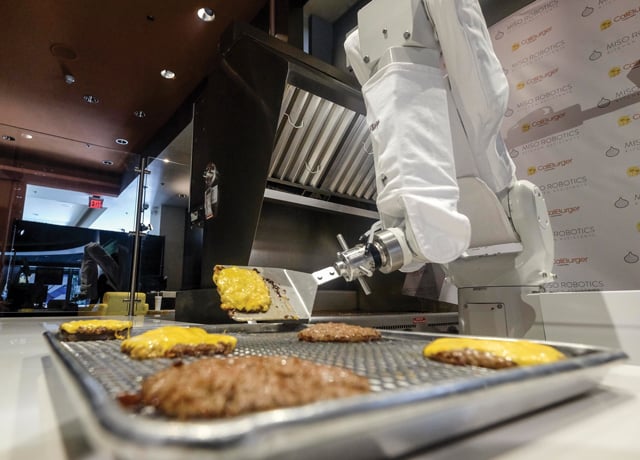Miso Robotics Inc.
Industry: Artificial Intelligence, Technology
Year Founded: 2016
Number of Employees: 30
Location: Pasadena
Money Raised: $13.1 million
Miso Robotics Inc. doesn’t believe robots should take every job – just some unpleasant ones.
The Pasadena-based company, founded in 2016 by a trio of Caltech alumni, makes Flippy, an articulated robotic arm designed to perform a variety of commercial kitchen tasks, such as flipping burgers or frying chicken.
Miso’s prototypes are already in limited use – Flippy made its debut in March 2017 when the company signed a contract with restaurant operator Cali Group to install its robotic burger-flipping arm in 50 of the restaurateur’s CaliBurger locations over the next two years. Miso Robotics added Dodger Stadium vending operator Levy Restaurants Inc. as a client in July, outfitting Flippy with a new prosthesis in order for it to fry chicken tenders at Los Angeles Dodgers games. Flippy cooked an average of more than 218 baskets of chicken per hour at Dodger Stadium during the latter half of the 2018 season and into the World Series. It is expected to remain part of the Levy kitchen team next season, according to Miso.
Levy and Cali Group are the only restaurant outfits Miso Robotics has publicly announced contracts with, but Chief Executive David Zito said the company has other clients and expects to add to its client roster in the first quarter of 2019.
Miso has raised $13.1 million since it was founded, and backers include Newport Beach-based patent licensing firm Acacia Research. The Flippy robotic arms cost $60,000, with an additional $1,000 monthly fee for maintenance and technical support, Zito said.
Local beginnings
Zito and co-founders Robert Anderson and Ryan Sinnet met through connections to Caltech’s mechanical engineering program, which all three participated in as undergraduates. Prior to founding Miso Robotics, Zito cut his teeth working as the head of Pasadena-based homework help website Cramster Inc., which raised $9 million before being sold to textbook retailer Chegg Inc. for an undisclosed sum in 2012.
Anderson, who now serves as head of engineering at Miso, was an intern at Hawthorne-based Space Exploration Technologies Corp. (SpaceX) after graduating from Caltech in 2016. Sinnet, who graduated slightly after Zito in 2007, went on to receive his PhD in mechanical engineering from Texas A&M University, joined Miso Robotics after spending nearly two years as a control software engineer with Burbank-based solar power plant hardware manufacturer eSolar Inc., which has raised $222 million over five funding rounds.
Lack of labor
Zito told the Business Journal he conceived of Flippy after talking with CaliBurger Chief Executive John Miller about the challenges of training and retaining kitchen staff.
The industry pain point addressed by Miso Robotics’ Flippy arm is relatively simple: Restaurants have high employee turnover rates and struggle, in particular, to retain workers in unpleasant back-of-house jobs.
Add a rising demand for prepared food, and Miso’s founders felt there was enough market demand to try out the concept.
“The U.S. has crossed over to (having) 51 percent of food made for us rather than at home, and that increase in demand for fresh foods is putting pressure on restaurant operators. They’re looking to innovate and coming to us,” Zito said.
Flippy tackles what kitchen workers identified as the most unfavorable or undesirable part of the job, Zito said, allowing employees to focus on customized orders and the hospitality elements of a restaurant.
Zito said getting away from a searing grill or vat of hot grease improves staff morale as well. Zito added that Flippy’s penchant for keeping employees out of the warmest areas of the kitchen is especially valuable at Dodger Stadium, which was built in 1959 and doesn’t have air conditioning.
Price points
Flippy is an alluring new technology with growing potential, but its price needs to drop before it becomes a mainstay in kitchens nationwide, according to Jerry Prendergast, owner of Culver City-based restaurant consultancy firm Prendergast & Associates.
Besides licensing fees for point-of-sale systems, which can total roughly $6,000 monthly, Prendergast said paying $1,000 per month to maintain a piece of kitchen equipment is inordinately high.
“I would have to see it used in more locations, in more varied environments and see the price go down, so it makes sense to put in my kitchens,” Prendergast said.
Based on an estimated $15 minimum wage, Prendergast calculated the average human fry cook makes approximately $24,000 annually. Cutting a cook and operating Flippy for multiple shifts could save a restaurant owner up to $500 per week, he estimated.
Redundancy in case of a Flippy malfunction is another concern.
“If a cook calls in sick, I’m sure I have another to take the shift,” Prendergast said.
He did acknowledge that the robotic arm could help restaurant owners in markets like Los Angeles where the food service labor pool is shrinking.
“If I want someone relatively well trained, I’m paying them significantly more, not because of minimum wage but the reality of the labor market,” Prendergast said. “The L.A. labor market is particularly hard compared to everything else.”
Miso Robotics’ Zito countered some of Prendergast’s criticism, noting that Miso can continuously update the robot to learn new skills, increasing productivity by reducing training time for existing employees.

